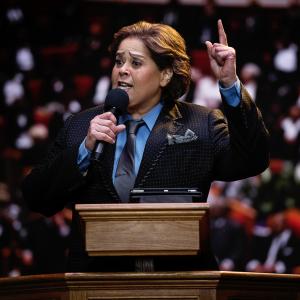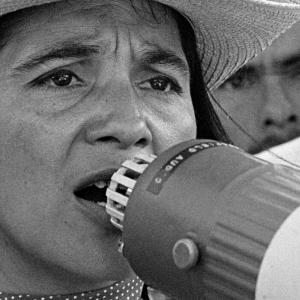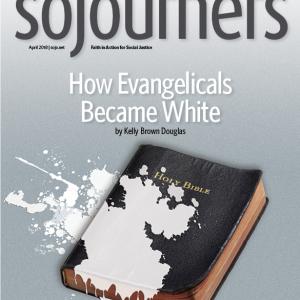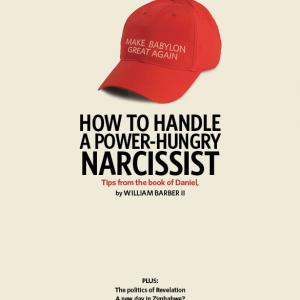Posts By This Author
New & Noteworthy
Four June cultural recommendations from our editors.

Courtesy of disturbingthepeacefilm.com
Choosing a Different Way
The documentary film Disturbing the Peace describes the path former Israeli soldiers and Palestinian fighters took from armed conflict to nonviolent peace activism, resulting in the creation of Combatants for Peace. A model for overcoming polarization and rejecting violence, in an unlikely place. disturbingthepeacefilm.com
Faith Remix
Author Melvin Bray presents a creative, questioning, culturally engaged approach to our sacred stories as a path to a stronger, more just, and loving faith. Better: Waking Up to Who We Could Be is a resource for Christians “for whom uncritical certitude is no longer working.” Chalice Press
Displaced People
Global Migration: What’s Happening, Why, and a Just Response explains key issues linked to contemporary migration and practical responses, guided by principles of Catholic social teaching. By Elizabeth W. Collier and Charles R. Strain with input from Catholic Relief Services. Anselm Academic
Prophets of Profit
In Brand® New Theology: The Wal-Martization of T.D. Jakes and the New Black Church , Paula L. McGee encourages pastors and scholars to see prosperity churches as a formidable force. She explores such churches’ troubling interweaving of commerce and faith and how they disempower their majority-female congregations. Orbis Books
Letters to the Editor
Letters to the editor from Sojourners readers
Hipster Privilege
D.L. Mayfield’s article (“Church Planting and The Gospel of Gentrification,” July 2017) hit home and is an important conversation. Out of economic necessity after a bout of homelessness, I moved into a neighborhood jokingly referred to as “meth alley” by the uptown people. Our neighborhood health statistics were dismal because of poor access to anything resembling fresh food. When we became the object of “saving” by some churches from the other side of town that wanted to be missional, they didn’t ask us what we needed. We became the project of outreach by young, white, educated, privileged religionists intoxicated by their specialness. The exuberant youths were quite clueless that we had some wisdom about what our neighborhood could use. Most were from two local Bible colleges and had grand ideas about urban outreach.
They planned a hipster coffee shop that the evangelical whites with privilege would use as a base of operation, providing tutoring to our youth. They believed they would open their doors to the unfortunate of my dismal neighborhood and we would come flooding in to be saved by their great goodness from our great need.
I just wanted to recover and get a job. What my saviors failed to see without exception were my strengths—my resilience, the gifts I wanted to bring to my community, and my long experience with making do in the most hostile of circumstances. They could have asked, and I would have told them patiently, but they weren’t listening because they knew all there was to know about poverty and how to fix it.
I didn’t have the gas money to get to church; they were going to Hawaii for a break from us.
My suggestion: If any church or Bible college wants to be missional, ask the community what they most need. Ask who the community leaders already are and help them! Jobs and microloans to small neighborhood businesses are a place to start. Transportation opportunities to those jobs and access to good food are tangible helps. Without giving neighbors the dignity of being understood as people that have much to contribute to our own communities, being “missional” alienates and harms.
Grace Boyd
Sequim, Washington
Summer Psalms
Thanks to Danny Duncan Collum for introducing me to Jessi Colter’s album The Psalms (“Strange and Beautiful Psalms,” July 2017). It is a balm to me during this summer’s heat. Once you hear it, there’s no turning back.
Dennis Abney
Orlando, Florida
New Language Needed
Regarding Leslie Copeland-Tune’s article “What Are Block Grants” in the June 2017 issue: I am frustrated when Medicare and Social Security are called “entitlement” programs. Of course, all who have contributed into each fund during their working lives are entitled to the benefits we receive, but Medicare is a federal health insurance program and Social Security is a federal retirement program. Unfortunately, both funds have been raided by Congress for other purposes and are now in some jeopardy. Perhaps if we used language other than “entitlements,” which gives the impression of being undeserved, these programs would be held in higher regard and protected.
Susan Holcomb
Newberg, Oregon
Letters to the Editor
Letters to the Editor from Sojourners readers
Spirit of Compassion
I read with great interest the article on Northmead Assembly of God’s Circle of Hope AIDS clinic in Zambia (“When the Spirit Comes Down,” by Wonsuk Ma, January 2017), because I spent six months in 2011 conducting research there with support groups for people living with HIV. Clinic clients I interviewed reaffirmed my observations about staff members’ dedication, often reporting that they were grateful that the clinic was in their low-income neighborhood. Most crucially, I noted how staff members showed acceptance and compassion toward all clients. While the clinic faces challenges—long lines, clients who sometimes do not adhere to their medications, excellent staff members who may be “poached” by other donors—it does important work in Zambia’s AIDS response.
Amy Patterson
Sewanee, Tennessee
Charismatic Failure
It is encouraging to hear about the good work being done in Pentecostal churches around the globe (“When the Spirit Comes Down”). However, there was not one word in the article about the plight of homosexuals living in these societies. These churches are often at the forefront of oppressing gay people in the name of religion. Until we all confront the horrific situation of gay people (ostracism, forced marriage, beatings, prison, and execution) in so many places, especially Africa and the Caribbean, I can’t take these churches or their brand of religion seriously.
Robin Van Liew
Holden, Massachusetts
Crowning Achievement?
Thank you for providing a magazine that I am able to count on for intelligence and sensitivity in both your writing and reporting. However, I must take exception to the claim that Elizabeth I “founded” the Anglican Church (“Entering my ‘Power Decade,’” by Catherine Woodiwiss, January 2017). While it is true she is credited for the eponymous settlement, those acts of Parliament did not “found” anything that did not already exist. They smoothed the waters so that the English church could proclaim the gospel in relative peace.
Carlton Kelley
Traverse City, Michigan
Hillbilly Business
I want to thank you for publishing the article by Susan K. Smith on John Rush in your December 2016 issue (“Can Business Be Beautiful?”). It presents a different (and more accurate) example of Appalachia than does J.D. Vance’s book Hillbilly Elegy. As a born-and-bred hillbilly, I take great umbrage at Vance’s book. It is a very courageous memoir of one family, but that’s what it is—the story of one very dysfunctional family and the salutary effects of the Marines on one very mixed-up young man. Most poor and working-class Appalachians have not become as disoriented and dysfunctional as Vance’s family. Many of them, like Rush, have started enterprises of their own or are otherwise engaged at jobs they find rewarding. While not all these businesses are social enterprises as is Rush’s, they all nevertheless indicate successful adjustments to situations in which people find themselves.
Mike Smathers
Crossville, Tennessee
Assets in Heaven
Please do more articles on businesses that have doing good in the world as their bottom line (“Can Business Be Beautiful?”). Business owner John Rush makes a point about the profit-making business model that it is the love of money that is a problem, not having money itself. A current line of research, however, is showing that it isn’t as simple as that; money and decision-making power over others quickly reduce compassionate awareness and behavior. Jesus was right about wealth: Good motivations and intentions are not enough. Any condition that reduces our sense of shared vulnerability with others works against our ability to live lives of universal love.
Arden Mahlberg
Madison, Wisconsin
From Just War to Just Peace
An Appeal to the Roman Catholic Church to Re-Commit to the Centrality of Gospel Nonviolence
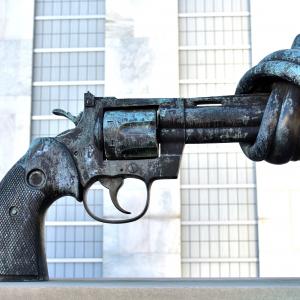
Lee Nanjoo / Shutterstock.com
1. Continue developing Catholic social teaching on nonviolence. In particular, we call on Pope Francis to share with the world an encyclical on nonviolence and just peace.
2. Integrate gospel nonviolence explicitly into the life, including the sacramental life, and work of the church through dioceses, parishes, agencies, schools, universities, seminaries, religious orders, voluntary associations, and others.
3. Promote nonviolent practices and strategies (e.g., nonviolent resistance, restorative justice, trauma healing, unarmed civilian protection, conflict transformation, and peacebuilding strategies).
4. Initiate a global conversation on nonviolence within the church, with people of other faiths, and with the larger world to respond to the monumental crises of our time with the vision and strategies of nonviolence and just peace.
5. No longer use or teach “just war theory”; continue advocating for the abolition of war and nuclear weapons.
6. Lift up the prophetic voice of the church to challenge unjust world powers and to support and defend those nonviolent activists whose work for peace and justice puts their lives at risk.
The Catholic Nonviolence Initiative is a consortium of attendees from the Rome conference and others who are advocating for a papal encyclical on nonviolence. Read the full statement at nonviolencejustpeace.net.
Letters to the Editor
Letters to the editor from Sojourners readers
A Red Flag?
Regarding the Episcopal church called “The Cathedral of the Confederacy” (“Robert E. Lee Worshipped Here,” by Betsy Shirley, April 2017): Token efforts of repentance such as the removal of the Confederate flag will not suffice; full biblical repentance requires massive restitution in order to repair the enormous oppression and damage done to African-American people over the centuries.
Lowell Noble
Riceville, Iowa
Spoiler Alert
It’s always great to read about an entrepreneur who shows that justice can be good business (“Grocery Store Inequity,” by Courtney Hall Lee, April 2017). I was interested to read of Jeff Brown’s effort to introduce quality, convenient shopping to low-income areas of Philadelphia because I lived in the southwest Germantown part of that city for two years back in the mid-1980s. I quickly noticed, when visiting the suburbs, that perishable food was much more plentiful and varied and lasted longer than food I bought at the “supermarket” a mile away from my apartment. One can only suppose that low-income folk did not find expensive, quickly spoiled food appealing and, since they didn’t buy it, healthy, fresh food was harder and harder to get. People are too often blamed for their own poor health habits. Please keep informing about the barriers faced in the name of “just business.”
Ann Larson
Essex, Vermont
Spivey’s Still Got It
Regarding “The Trump Presidency, One Year Later,” by Ed Spivey (April 2017): I laughed so many times that my wife wanted to read it! I think humor may be one of the best antidotes for the toxicity of our times. Spivey’s humor is also self-deprecating, which is more effective than the self-righteousness I feel and express so often. Thank you, Ed, for making us laugh while reminding us that we have all sinned and come short of the glory of God.
Charles R. Crawley
Cedar Rapids, Iowa
Don’t Discount Adam Smith
Several points from your interview with Chuck Collins (“Wealth and the Common Good,” March 2017) illustrate the compatibility of his ideas with the economic system of capitalism proposed by Adam Smith. Smith sharply criticized stark economic inequalities. He advocated good wages for workers, writing that efficiencies in the division of labor made it possible to spread wealth even to the lowest ranks of the people. He advocated progressive taxation. And he argued that people were the same—no “myths of deservedness” for Smith. Finally, while Smith did not say anything about campaign finance reform, his excoriating comments on the political power of the wealthy are potent. The clear inference is that the wealthy should not have disproportionate electoral power.
For too long, American political discourse has featured a false dichotomy between capitalism and socialism. This dichotomy has been based on a gross distortion of Smith’s system. It is time to change the conversation to what kind of capitalism would be best for the country and the world: the savage capitalism of recent decades, or the capitalism with justice and equal opportunity that Smith advocated.
John E. Hill
Quincy, Massachusetts
“But what about ...?” Write to letters@sojo.net or Letters, Sojourners, 408 C Street NE, Washington, DC 20002. Include your name, city, and state. Letters may be edited.
Letters to the Editor
Letters to the editor from Sojourners readers
Eye of the Beholder
In “Where Protestantism Went Wrong” (February 2017), Wesley Granberg-Michaelson rightly critiques some of the consequences of the Reformation. Surely he is inaccurate, however, in arguing that “the Reformation bred a mistrust of aesthetics.” It would be more accurate to state that it promoted a different aesthetic than that prevalent in Catholicism. New England Puritans, for example, developed a “plain style” in literature and architecture evident in the accessible prose of William Bradford’s Of Plymouth Plantation and the beauty of many Congregational churches still standing in town squares. This plain style influenced modern literature and the “form follows function” aesthetic of much modern architecture. Sometimes, to quote a fine expression of the Protestant aesthetic, “ ’tis a gift to be simple.”
Walter Hesford
Moscow, Idaho
Name Drop
Jim Wallis has asked the question that I, and I am sure others, have been wrestling with for some time: “What is an evangelical?” (“White Evangelicals and the Election,” January 2017). As an 81-year-old Lutheran pastor, I have been advocating that the Evangelical Lutheran Church in America drop the word “evangelical” from our name. The word has been hijacked; the original meaning has been perverted! Retaining the word in our church’s name distorts the very heart of our identity. The change should not be that significant for Lutherans; when “evangelicals” meet, the ELCA is usually absent. It is sad but true that other words must be employed to convey the powerful identity that the word evangelical once held.
Bernard Kern
North Richland Hills, Texas
Stick to the Facts
I was disappointed in your January 2017 issue’s exclusive focus on the danger Trump poses because of a “racist, misogynistic, ethnocentric brand of nationalism” and policies that likely will hurt poor, vulnerable people (“Is America Possible?” by Heath W. Carter). What of his cavalier attitude toward facts, evidence, and truth, such as his disputing the overwhelming scientific evidence for human-caused global warming? When our culture is on a binge of finding “truth” in unwarranted places, and people are believing what they want to believe no matter how far off the mark (with the encouragement of our president), our democracy is in serious, long-term danger.
Roger Brooks
Madison, Wisconsin
Stop Talking
In David Gushee’s November 2016 piece on abortion (“The Abortion Impasse”), where are women’s voices? Where is the acknowledgment that there are no women’s voices here? Gushee supports not banning abortion. In some cases. I get that. But the rhetoric, implicit and explicit, embodied in such statements and phrases as “abortion is the sad song that never ends,” “the everyday ‘garden variety abortions’ go on and on,” and “that miserable drive to the abortion clinic” send chills of exclusivity, domination, privilege down this reader’s spine. “What is an anxious Christian to do about all this?” Listen to women’s and girls’ stories. Listen. And listen. And listen.
Priscilla Atkins
Holland, Michigan
New & Noteworthy
Four December culture recommendations from our editors.

Meaghan O'Malley / Creative Commons
Refusing Silence
The documentary film The Uncondemned tells how a group of international lawyers and activists, all under 35 when they began, fought to get the first conviction of rape as a war crime—and how Rwandan women defied death threats to testify and win justice. theuncondemned.com
Welcoming the Light
In The Light of the World: Daily Meditations for Advent and Christmas, Phyllis Zagano, writer and scholar of Catholic spirituality and women’s leadership in the church, offers incisive reflections and prayers to help readers “become quieter, slower even, pointing to the Christ who is to come.” Twenty-Third Publications
Power-Pop Prophets
The Shondes, a queer, feminist pop-punk band from Brooklyn, weave activist fervor with progressive Jewish prophetic imagination and spirituality: “Hope can anchor any strategy,” is a telling lyric. The melodious songs on their new album, Brighton, soar with violin and Louisa Rachel Solomon’s clear, strong voice. Exotic Fever Records
Home in a Strange Land
Words in Transit: Stories of Immigrants is a book of oral histories from nearly 30 immigrants and refugees who have settled in western New England. Edited by Ilan Stavans, with photographs by Beth Reynolds, it presents snapshots of the courage and gifts that flow to our country. New England Public Radio
New & Noteworthy
Four July cultural recommendations from our editors.
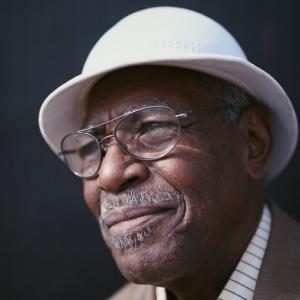
Courtesy of facebook.com/DonBryantMusic/
Silver Soul
Memphis-born Don Bryant, who is 74 but sounds decades younger, has made a throwback-yet-fresh soul album, Don’t Give Up On Love. Along with the standout, gospel-fired “How Do I Get There?” are exuberant grooves and smooth ballads on more earthly themes. Fat Possum Records
Mutual Respect
Evangelical-rooted professors Marion H. Larson and Sara L.H. Shady believe interfaith dialogue is vital—and doesn’t demand watered-down faith. In From Bubble to Bridge: Educating Christians for a Multifaith World , they offer Christians the perspective and tools to build bridges. IVP Academic
Every Day Holy
Faithful Families: Creating Sacred Moments at Home , by Traci Smith, offers 50 do-it-yourself ideas to incorporate spiritual practice into the bustle and hum of families with children. Includes activities suitable for different age levels (including the child at heart). Chalice Press
Write Me a Letter
Shortly after the 2016 U.S. election, novelist Carolina De Robertis invited writers and activists to explore themes of hope in epistolary essays. The result is Radical Hope: Letters of Love and Dissent in Dangerous Times, with Junot Diaz, Alicia Garza, Jane Smiley, Jeff Chang, Celeste Ng, Hari Kunzru, and others. Vintage
Letters to the Editor
Letters to the editor from Sojourners readers
Veterans’ Affairs
Wonderful to see Standing Rock featured on the front cover and within the February 2017 issue (“A Chorus of Resistance,” by Gregg Brekke). One other moment people might have missed: Some among the thousands of veterans supporting the water protectors went down on their knees to apologize for the atrocities committed by Army units against the Sioux people over the centuries of white hegemony. The elders forgave them. I, for one, wept at the grace of this.
Katharine Preston
Essex, New York
Where Two or More Are Gathered ...
There are some things in the article “Where Protestantism Went Wrong” (by Wesley Granberg-Michaelson, February 2017) that leave me unsettled. The article seems to indicate that a single person (a bishop or whomever) is a better arbiter of the truth than a council or a group (presbytery, synod, etc.). By declaring the priesthood of all believers, the Reformation raised up the importance of all people—educated, ordinary, or otherwise. My experience has been that, on the whole, a council or group is more likely to arrive at a truthful, correct, or workable solution to whatever issue is before them than any one individual in the group.
Mike Smathers
Crossville, Tennessee
‘Duck’ And Cover?
I finished my reading of Rose Marie Berger’s “Mosquito Manifesto” (February 2017) with a positive feeling. Almost immediately, however, another image flashed through my mind: a short cartoon in which Donald Duck goes on vacation. Sitting in his lounge chair on the lawn, relaxing at last, Donald is set upon by a lone mosquito. Those who know the temperament of Donald Duck can guess the outcome. The final scene shows the mosquito escaping into the sky as Donald destroys his mountain cabin with shotgun blasts in a last vain attempt to rid the world of this pesky mosquito.
Is there not a real danger that instead of bringing down the giant, Lilliputian style, we mosquitos might actually provoke annihilation, not just of ourselves but of many unintended victims of the wrath of the powerful who will not care who they hurt in their attempts to rid the world of us?
David Tidball
Roseville, Minnesota
Not Alter Egos
In the February 2017 issue of Sojourners, Will Willimon makes an excellent case for the need to address racism from the pulpit (“Preaching the Devil Out”). However, as a Christian mental health professional, I disagree with his contrast between preaching and psychotherapy. I agree the two are separate, but one is not inferior to the other. Willimon characterizes psychotherapy as a luxury only privileged people use. This is based on historical fact, dating back to Freud, when psychoanalysis was provided only to the very richest. Today, however, mental health is constantly striving to be available to the poor and culturally diverse. I can think of no other institution, including the American church, that is more dedicated in practice to understanding and spreading unity among diverse people groups. I suggest that therapists and pastors pursue this goal together, using our unique talents in tandem, instead of trying to become an alternative to the other.
Nick Schollars
via email
“On the other hand…” Write to letters@sojo.net or Letters, Sojourners, 408 C Street NE, Washington, DC 20002. Include your name, city, and state. Letters may be edited.
Letters
Letters to the editors from Sojourners readers.
Letters to the editors from Sojourners readers.
We Cannot Rest; We Must Rest
We cannot afford to abandon the rites and rhythms that sustain us.
HERE'S A PARADOX: If justice delayed is justice denied, we cannot rest while anyone suffers; at the same time, we can’t work tirelessly for justice without rest. It’s the kind of pesky conundrum we face just as we’re settling in for a night of sweatpants and Netflix: The prophets in the Bible decried those who sit on fine couches while their neighbors go hungry ... but does that mean it’s wrong to re-watch the entire season of Queer Eye when we could be doing something more productive?
In this issue, Baptist minister J. Dana Trent uses the fourth commandment (“Remember the Sabbath day, and keep it holy.”) to reframe our quandary. Through this commandment to practice “ritual rest from our labor,” writes Trent, “we opt out of tyranny and opt into care for one another.” At its heart, Sabbath rest isn’t a pause from justice work; it’s a way of disrupting a culture of what Walter Brueggemann describes as “endless desire, endless productivity, and endless restlessness.”
New & Noteworthy: May 2018
Four May recommendations from our culture editors.
From Stage to Screen
Pulitzer Prize finalist Anna Deavere Smith brings her critically acclaimed play Notes from the Field to the screen. Based on hundreds of interviews with students, teachers, parents, and administrators, the production brilliantly highlights the disturbing U.S. school-to-prison pipeline. HBO
Love for Creation
Creation Care: A Biblical Theology of the Natural World presents practical, faithful responses to environmental issues. With scientific data and comprehensive biblical theology, Douglas J. Moo and Jonathan A. Moo invite readers to explore their relationship with creation and the Creator. Zondervan
Letters
Letters to the editors from Sojourners readers.
Susan Thomas
Tucson, Arizona
New & Noteworthy
Four April culture recommendations from our editors.
Yes, She Can
Dolores Huerta changed the course of history when she formed what became the United Farm Workers union with César Chávez. Often overshadowed by her co-founder, Huerta’s defiant resistance, struggle, and sacrifice take center stage in Peter Bratt’s captivating documentary, Dolores. Premieres March 27 on PBS. doloresthemovie.com
An Emerging Voice
Folk singer Azniv Korkejian was born in Aleppo, Syria, to an Armenian family. Relocated to Saudi Arabia and then to the U.S., Korkejian’s moniker, “Bedouine,” is drawn from the name of a nomadic group. With gentle guitar and smooth vocals, her self-titled debut album affirms her identity as a wanderer. Spacebomb
Letters
Letters to the editor from Sojourners readers.
The Present Political Quagmire
The February 2018 issue raises big questions for our country and the evangelical church. The authors of “Is This a Bonhoeffer Moment?” (Lori Brandt Hale and Reggie L. Williams) and “When Seminary Becomes a Threat” (Wesley Granberg-Michaelson) rightly point out the risks of making parallels between two different historical contexts (Germany in the 1930s and 21st century America). Yet there are striking similarities, particularly the ease with which evangelical Christians, in America today and in Germany then, accepted populist movements and their nationalistic programs. In both cases, the populist forces were able to exploit societal anxieties and make a sentimental appeal to a cultural form of Christianity that served its purposes.
The slogan of the Nazified German Christians was “Germany our goal, Christ our power!” Based on a distorted interpretation of Lutheran theology, a group of theologians at the time issued a document, known as the Ansbacher Ratschlag, opposing the Barmen Declaration. It was addressed to the National Socialist Evangelical Union of Pastors and included this statement: “... we as believing Christians thank the Lord God that in this hour of need he has given our people the Fuhrer as a ‘good and faithful sovereign,’ and that in the Nationalistic Socialist state he is endeavoring to provide us with disciplined and honorable ‘good government.’” This distant mirror of attitudes—and even words—that are with us today should give Christians great concern. The vulnerability of the American church did not come about in the presidential election of November 2016. The present political quagmire has only exposed it.
Dave Shelman
Corbett, Oregon
Acknowledging Assault
I have just read “‘A Terrorist War Against Women,’” by Serene Jones (February 2018). Reading stories of sexual violence against women gives me hope that something can be done about that evil. But there is one voice that is not heard too often. It is that of sexual violence against men by male authority figures. I suspect there are many men out there who trusted a male authority figure and were assaulted. We are hurting.
Anonymous
On Rage and Apathy
If our beliefs paralyze us from participating in the systems, what good are they?
IN THIS ISSUE, Victoria Newton Ford writes about Ava DuVernay’s forthcoming movie adaptation of Madeleine L’Engle’s bestselling fantasy novel A Wrinkle in Time. As in the book, Meg Murry travels through time to find her missing father. But DuVernay, who also directed Selma (2014) and 13th (2016), adds a twist. In the film, Meg and her brother, Charles Wallace, are black. For Ford, this delivers something the novel cannot: “a hero of the universe who, in our current political space and time, is afforded the least agency.” In other words, writes Ford, “Meg is an angry black girl.”
A film that depicts a black protagonist—in all her fury, pain, and love—is especially radical, Ford explains, because America has continually “sought to conscript ... black [women] into a toolbox for the country’s deliverance.” She points to the political heroization of Oprah, Michelle Obama, and the black women voters in Alabama who defeated Roy Moore’s senatorial bid.
New & Noteworthy
Four March culture recommendations from our editors.
A Returning Voice
Songwriter Audrey Assad, daughter of a Syrian refugee, releases her first album of original material in four years. Evergreen features songs about “rebirth, the rebuilding of trust, and the discovery of joy and love.” PledgeMusic
Respect for Refugees
Artist and activist Ai Weiwei brings the global refugee crisis to the big screen through his captivating documentary Human Flow. Filmed in 23 countries, the documentary features stories of desperation, courage, and resilience and speaks to our shared humanity. humanflow.com
Letters
Letters to the editor from Sojourners readers.
A Prophetic Exchange
“How God Intervenes” (January 2018), with Kenyatta Gilbert and Walter Brueggemann, is a wonderful interview. How blessed we are to have these two wise and articulate prophets among us. There is so much insight in their challenging and inspiring exchange.
Joan O’Brien
Wethersfield, Connecticut
Political Drama, Then and Now
We are not the first to grapple with a leader whose only regard is for himself.
““DRAMATIC, POLITICAL, incendiary.” They seem like words you’d see splashed across the dust jacket of Fire and Fury, the controversial account of the Trump White House that generated a firestorm of presidential tweets when it was released earlier this year. But in this issue, Bible scholar Reta Halteman Finger uses those words to describe an older form of political drama: the book of Revelation.
Despite Revelation’s reputation as a harbinger of doom, Finger explains that the final book in the New Testament needs to be understood as an example of apocalyptic resistance literature, a genre of writing originally “intended to bring hope during times of political uncertainty or persecution.” This hope isn’t rooted in imperial acts of violence; it’s rooted in the victory of the Lamb, slaughtered but resurrected.
New & Noteworthy
Four February culture recommendations from our editors.

image via pbs.org
A Voice of Compassion
Artist and activist Mavis Staples speaks to the increasing social divide in her latest album, If All I Was Was Black. In this interracial and multigenerational project, Staples doesn’t shy away from anger but, as always, her ultimate message is the promise of positive change. Anti- Records
Peacemaking with Purpose
Jon Huckins and Jer Swigart, co-founders of The Global Immersion Project, believe peacemaking practices should be grounded in Jesus’ teachings. Mending the Divides: Creative Love in a Conflicted World is full of stories, insights, and questions for discussion and shows what it means to live as a true global citizen. InterVarsity Press







